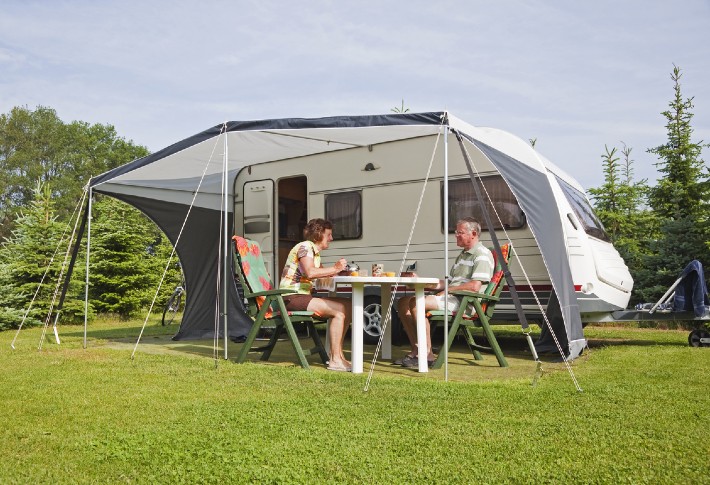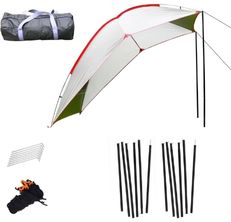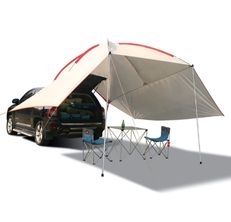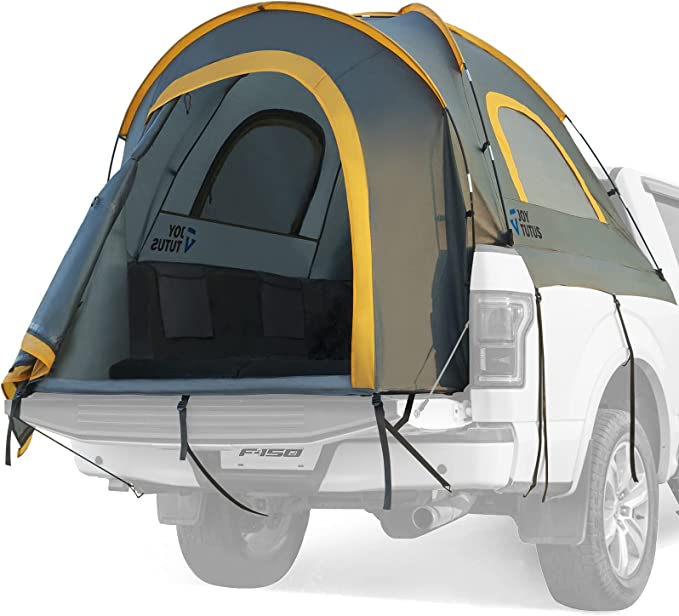The Best Trailer Tents for Your Next Outdoor Adventure

- 1 Reviewing the Top-Rated Trailer Tents of 2024
- 2 Buying Guide: Trailer Tents
- 3 People Also Asked
- 3.1 How much should I spend on a trailer tent?
- 3.2 Are there any additional accessories I might need with my trailer tent?
- 3.3 Is there a risk of condensation in my trailer tent?
- 3.4 Are folding campers and trailer tents the same?
- 3.5 Do I need to consider the towing capacity of my vehicle when buying a trailer tent?
- 3.6 Should I get insurance while using my trailer tent?
- 3.7 What exactly is the purpose of a trailer tent?
Trailer tents have become increasingly popular in recent years as a great way to enjoy the outdoors without having to worry about the hassle of setting up a tent. They are essentially a trailer with a tent attached to the back that can easily be set up and taken down in just a few minutes, as opposed to a traditional tent. These tents offer the same amount of comfort and convenience as a traditional tent but with the bonus of being able to tow them to your campsite.
Choosing one option from a plethora of choices available can quickly become overwhelming. We’ve reviewed some of the highest-rated trailer tents of 2024 to help you explore the great outdoors without sacrificing comfort.
Reviewing the Top-Rated Trailer Tents of 2024
Wind Tour Trailer Tent
- Sturdy, waterproof build for long-lasting use
- Easy to set up and take down
- Comes in three color options
- Not ideal for windy weather
If you want to experience the ultimate convenience of camping outdoors, the Wind Tour Trailer Tent is the right choice. With this tent, you can enjoy the convenience of parking your vehicle near your camping site and having the protection of a roof over your head — whenever and wherever you need it.
This trailer tent is thoughtfully designed to provide you with enough space to accommodate a picnic table and four chairs, making it perfect for hosting family gatherings or a fun day at the beach. To keep you safe during harsh weather conditions and provide you with optimal protection from the elements, this trailer tent is made using premium-quality, waterproof polyester with polyurethane coating. It’s reinforced with fiberglass and steel poles, creating a firm structure that’s engineered to be water-resistant and long-lasting.
In addition to providing shelter on camping trips, you can use it as a sun shade for any car model to protect against harmful UV rays while spending time outdoors. With its impressive folding storage, the tent can easily fit into any vehicle without taking up too much space, making it easy to carry along wherever you decide to go. Its durable construction and useful features make this trailer tent a top pick to make your next outdoor adventure unforgettable.
Redcamp Trailer Tent
- Adjustable height for versatility
- Offers UV protection as well
- Comes with a storage bag
- No assembly instructions
The Redcamp Trailer Tent is an excellent choice if you’re looking for a dependable companion for your next camping trip. Not only does it pop up into a mobile home, but it also has enough space for all of your off-grid necessities. This product offers versatility, with a universal fit for a trailer, van, pickup truck, SUV, and more.
This awning tent has a three-tier construction that provides waterproof protection to keep you safe during outdoor adventures, and the tearproof strength ensures that the trailer tent will last for years of use. Two height-adjustable poles make it wind resistant, while six ground stakes and eight wind ropes keep it secure. The fabric also blocks harmful UV rays and provides a large area of shade to enjoy your day without worrying about tanning or sunburns.
This trailer tent is made with a blend of waterproof PU and tearproof, ripstop fabric that will withstand the elements and provide lasting reliability. It’s also backed by a 365-day limited manufacturer warranty in the event of any product issues. With this warranty and the other features included in this product, this trailer tent makes an excellent choice for anyone looking for a reliable solution for their outdoor needs.
JoyTutus Trailer Tent
- Waterproof design
- Features three windows
- Extra carry bag
- Seams could be stronger
The JoyTutus Trailer Tent is a great choice for those who want to take the camping experience with them anywhere they go. This waterproof tent provides excellent water-resistant performance with a PU2000 water-proof coating and a bottom layer that prevents rainwater infiltration. The tent also features three windows for sightseeing, hunting, or observation, as well as four mesh bags and an extra carry bag that provide plenty of storage space.
The ease of setup makes this tent even more attractive. Installation only requires you to connect the front and rear poles securely; if a pole breaks due to improper operation, this company offers a free opportunity to replace it. The tent is compatible with pickup trucks of 5.5 to 6 feet in bed length, such as a Ford F150, Ram, Silverado, Tundra, Sierra, or Titan.
Buying Guide: Trailer Tents
When it comes to camping, a trailer tent is both convenient and comfortable. It provides a good balance between comfort, ease of use, and protection from the elements. Because shopping for a trailer tent can be an intimidating task, we’ve put together this comprehensive buying guide to help you choose the perfect product for your next trip.
How to Choose a Quality Trailer Tent
Size
The size of the trailer tent you should purchase depends on how many people will be using it and how much space your vehicle has to transport it. Generally speaking, smaller tents are suitable for up to four people, while larger tents can accommodate 10 people or more. You should also consider the height clearance of your car when choosing a model, as taller tents might require roof racks or other special fittings to fit safely in your vehicle.
Weather resistance
The weather resistance of the fabric used in the trailer tent should be one of your primary considerations, as you won’t want to get drenched in rain or sunburnt from a beach trip. Most types of fabrics used in trailer tents are designed to provide some level of protection from wind and rain. If you plan on camping in areas that tend to experience extreme weather conditions, you’ll want to ensure the fabric has been designed to withstand these conditions. Look for tents with waterproof fabric that is both durable and long-lasting.
Weight
The weight of trailer tents varies depending on size, material use, and safety features. Make sure to check with your vehicle’s manual to determine how much weight it can safely tow, then choose a tent that won’t overload your vehicle. Otherwise, the tent will be of no use to you, or you will have to rent a bigger vehicle to tow the tent.
Most trailer tents range from around 25 pounds to over several hundred pounds. It’s also important to note that added accessories, such as awnings and annexes, can increase the overall weight of the trailer tent significantly, so make sure to factor this into your decision-making process as well.
Amenities
When choosing a trailer tent, consider all of the amenities available on it. These might include space for sleeping, an awning for shade coverage, lighting, water storage capabilities, beds, solar panel compatibility, and other camping equipment storage options. If space is limited in your car or truck bed for carrying gear, look for models with more amenities so that you can take advantage of all the features available in your trailer tent.
Durability
You will want your trailer tent to last through multiple camping seasons without showing any signs of wear and tear. Look for materials like aluminum frames and ripstop fabric, which are designed to be lightweight yet sturdy enough to withstand rough use. Sturdy poles, strong stitching, and waterproofing all contribute to a durable product that will last for years.
Storage space
When choosing a trailer tent, you should consider its storage capabilities. Look for models that offer plenty of pockets along both walls and storage compartments underneath the beds and couches. It allows you to store essential items safely while traveling without having them cluttering up the living space inside your temporary lodging area.
Trailer tents with built-in closets are also an excellent choice as they provide a convenient place where you can keep your essentials off any dirty surfaces outside. These features save you time spent organizing belongings during transitions between locations.
Ventilation options
When selecting a trailer tent, it’s important to factor in ventilation options. Vents can help improve air circulation within the sleeping area during warmer months to keep everyone cool throughout all hours of the night. Proper ventilation ensures everyone sleeps better after long days out exploring nature.
It’s better to go for a trailer tent that has adjustable air vents built into walls, windows, roofs, or flooring. Mesh panels in some tents also allow optimal air circulation while preventing biting insects from entering the tent.
People Also Asked
A: The cost of a trailer tent can vary widely depending on the size and features included. Basic models can range from around $500 to more than $3,000 for higher-end models. It's important to consider how often you plan to use your trailer tent when selecting one and any additional accessories you may need, such as an awning or storage cover.
A: Yes, depending on the type of camping trips you take there are various additional accessories you may wish to purchase along with your trailer tent. These may include annexes for extra space, awnings for shade, storage covers, groundsheet protectors, sleeping mats, pillows, lamps, chairs, cookers, cool boxes, hot water systems, power packs, and solar panels. It’s important to think about whether these items would enhance your camping experience before committing to buying them, as sometimes extra features can quickly add up in cost.
A: Yes. Due to its design, there is always some risk of condensation forming inside a trailer tent. It can be either from sweat generated by the occupants or simply through changes in temperature between nighttime and daytime hours while camping outdoors. To reduce this risk, it's important to ensure that all vents are kept open where possible (to allow air circulation) and that adequate ventilation is provided throughout, particularly around any areas where cooking takes place. Using breathable fabrics such as cotton is recommended over synthetic materials as this helps prevent moisture build-up.
A: When set on site, there is a big difference between folding campers and trailer tents. The trailer tent is generally a tent in a trailer that comes out and pins to the ground while still using the trailer portion as a sleeping place. Once set, the trailer hitch is generally the only element that distinguishes it from a standard frame tent. A folding camper has no canvas and you can pinch it directly into the ground. Bedroom portions often fold out from the trailer section, staying above the ground once you assemble it. Folding campers often cost more than trailer tents due to their features. This difference tends to level out when purchasing from the second-hand market, where you can find good-condition versions for a cheaper price. Folding campers are often easier and faster to set up and disassemble than trailer tents.
A: You should have no problems towing a trailer tent if you own a bigger, more powerful car because most of them are very lightweight. You can check for the maximum weight you may tow in your vehicle's owner's manual. You can also get this information from the vehicle identification number (VIN) plate on the automobile, which is normally present under the hood or inside the driver's door. For safe towing, we recommend a weight of up to 85% of your car's gross weight. If you purchase a trailer without brakes, it must be less than 50% of your vehicle's curb weight.
A: Your automobile insurance coverage will cover third-party road hazards, so if your trailer collides with another vehicle or person, you will be lawfully protected. The trailer and its belongings will not be protected under your auto insurance policy. That's why you will need to get trailer insurance for possible damage. Some experts specialize in providing cover for all types of trailer tents, from camping equipment to bedding and linen, for as little as $30 per year.
A: It’s the ideal mix of a caravan and a tent with the living space often bigger than that of a caravan. In a trailer tent, you sleep on a comfy mattress that’s not directly touching the ground and you feel closer to nature while also enjoying the comfort of a tent.



